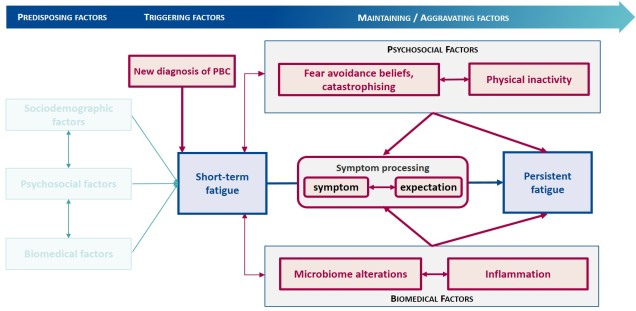SOMA.LIV
Fatigue in Primary Biliary Cholangitis: Factors Associated With Severity and Persistence as Future Therapeutic Targets
Background
Fatigue is a common symptom and the major ‘unmet need’ in the management of patients with primary biliary cholangitis (PBC). There are few prospective studies that address the development of PBC-associated fatigue over time and histologic grades. At the same time, few biological and psychosocial risk factors and mechanisms have been identified that could explain the development and maintenance of fatigue in PBC. In order to identify patients at risk for severe fatigue at an early stage, prospective studies that apply a comprehensive approach, synthesizing perspectives and integrating potential biomedical and psychological risk factors of fatigue are needed.
Aims
It is the overall aim of our project to identify factors that determine the course and severity of fatigue as the main unmet clinical need in PBC, and to target these factors within deliverable interventions, in order to improve quality of life for our patients.
Working programme
In a cross-sectional part of our prospective twelve-month cohort study, we aim to simultaneously examine clinically relevant biomedical and psychosocial factors, and systematically assess and compare associations and interactions between these factors and fatigue in n = 240 patients with PBC (a patient group severely affected by fatigue) and n= 240 patients with PSC (a control cholestatic liver disease group much less affected by fatigue).
In a prospective part, we will longitudinally monitor these variables to identify factors that determine the severity of fatigue over time. In order to complement our quantitative data by evidence other than self-report, we will embed an experimental study and qualitative interviews, whereby the interviews will focus on a subsample of n = 48 patients with newly diagnosed PBC. Both approaches represent a valuable opportunity for an in-depth exploration of mechanisms of fatigue perception, development and maintenance.
Expected impact
By applying a mixed method approach within a prospective design, we will gain innovative knowledge on the predictive role of biomedical and psychosocial risk factors for fatigue that are amenable to change. This will enhance our understanding of the etiology of PBC-fatigue and enable the design of interventions to reduce fatigue. In terms of the overall aims of RU SOMACROSS, we will contribute to the development of a disease-overarching multivariable prediction model for persistent somatic symptoms, which will facilitate a common understanding of chronic symptoms across diseases and medical disciplines.





